|
|
|
Sort Order |
|
|
|
Items / Page
|
|
|
|
|
|
|
| Srl | Item |
| 1 |
ID:
120781
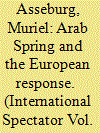

|
|
|
|
|
| Publication |
2013.
|
| Summary/Abstract |
Europeans enthusiastically embraced the Arab Spring. However, the EU and its member states have lacked significant influence in a neighbouring region in turmoil. The EU has not devised new and more appropriate approaches towards the region, but rather relied on its traditional tools and frameworks. The Eurozone's financial crisis and threat perceptions have quickly underminded the readiness of EU member states to contribute meaningfully to Arab transformations with money, market access and mobility. In addition, European support has not been equally welcomed across the region, and delays in terms of building empowered governments have prevented a quick impact. Moreover, the violent power struggles triggered by the Arab Spring have revealed the EU's weakness with regard to effective conflict prevention and timely crisis management - and thus created an environment averse to democratic transformation and regional stabilisation.
|
|
|
|
|
|
|
|
|
|
|
|
|
|
|
|
| 2 |
ID:
120780
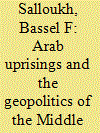

|
|
|
|
|
| Publication |
2013.
|
| Summary/Abstract |
The contest between Saudi Arabia and Iran played out in Lebanon, the West Bank and Gaza Strip, postwar Iraq and, to a lesser extent, Yemen and Bahrain, has shaped the geopolitics of the region since the 2003 US invasion and occupation of Iraq. The Arab uprisings intensified this geopolitical contest and spread it to Syria. The sectarianisation of the region's geopolitical battles, and the instrumental use of some of the uprisings for geopolitical ends, has hardened sectarian sentiments across the region, complicated post-authoritarian democratic transitions, and, at least in Syria's case, transformed its popular uprising into a veritable civil war.
|
|
|
|
|
|
|
|
|
|
|
|
|
|
|
|
| 3 |
ID:
120782
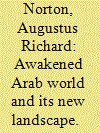

|
|
|
|
|
| Publication |
2013.
|
| Summary/Abstract |
The Arab Awakening augurs the return of political contestation to key Arab societies in which little more than token opposition had been tolerated. Unfolding experiments in democratisation in which Islamically-oriented parties are leading players are underway but the prospects for the consolidation of stable political systems in key counties, such as Egypt or Syria are problematic. These developments have hastened a new regional balance of power in which Saudi Arabia and its allies have sought to stem the tide of change as well as thwart the hegemonial ambitions of Iran. Persistent issues, particularly the Israel-Palestine conflict, remain unresolved and have a powerful grip on the conscience of the Arab world. Key external powers, especially the United States, confront not only stubborn familiar issues but also a host of new strategic, economic, diplomatic and military challenges.
|
|
|
|
|
|
|
|
|
|
|
|
|
|
|
|
| 4 |
ID:
120785
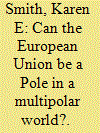

|
|
|
|
|
| Publication |
2013.
|
| Summary/Abstract |
Can the EU serve as a pole in a multipolar, interdependent international system? The EU will face three particular challenges operating in such a system: the challenge of re-establishing credibility after the euro crisis; the ever-present challenge of achieving unity among the member states; and the challenge of adapting foreign policy behaviour to match the new international environment. There is a risk that the EU could slide into irrelevance.
|
|
|
|
|
|
|
|
|
|
|
|
|
|
|
|
| 5 |
ID:
120777
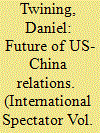

|
|
|
|
|
| Publication |
2013.
|
| Summary/Abstract |
China and the United States have just experienced political transitions that allow the leaders of both countries to focus on bilateral relations free from the pressures of domestic political campaigns. But the domestic politics of the bilateral relationship inside each country are, like the structural tensions between the established power and the rising challenger, intensifying, as Washington takes new steps to assert its primacy in Asia and Beijing works to edge America out of its neighbourhood. US-China relations are likely to be less stable and more prone to conflict over President Obama's second term, unless the two nations can arrive at a modus vivendi to keep the peace in Asia. The challenge is that such an entente likely requires the kind of political change in China its leaders seem determined to block for fear of the threat it would pose to their own legitimacy. The reverberations of a relationship that is conflict-prone, but in which conflict holds such downside risks for both countries, will be felt well beyond Asia.
|
|
|
|
|
|
|
|
|
|
|
|
|
|
|
|
| 6 |
ID:
120783


|
|
|
|
|
| Publication |
2013.
|
| Summary/Abstract |
The political and strategic landscape of the Middle East and North African region has changed dramatically since late 2010 and the events now loosely defined as the 'Arab Spring'. The dust has yet to settle in many Arab capitals and 2013 is set to be another defining year for the greater Middle East as regional actors, particularly new Islamist-led governments, take on more direct roles in influencing political, military and social developments in the Arab world. Israel and the Palestinian factions of Hamas and Fatah are not immune to these developments and while progress towards peace has been all but non-existent, change in the region must not necessarily lead to more tensions and conflict. The EU and US should work to establish greater Arab ownership of the diplomatic process, convince Israel that its security is best served by assuming a proactive approach to its changing neighbourhood and strive to harness the new realities in the region to modify the incentive calculus of the major domestic players in the conflict.
|
|
|
|
|
|
|
|
|
|
|
|
|
|
|
|
| 7 |
ID:
120784


|
|
|
|
|
| Publication |
2013.
|
| Summary/Abstract |
Israel's international position has declined in recent years. Even if its relationship with the EU - and even more with the US - is solid, there have been frictions that are not likely to disappear in the years to come. Its relations with other states, from Middle Eastern countries to India and China, are either highly problematic or have not improved despite the Israeli government's efforts. It is Israel's policy in the Occupied Territories that is being increasingly criticised and this is creating a sort of 'vicious circle' in Israel: the critiques reinforce Israeli's 'bunker mentality', strengthening the ethno-nationalist character of Israeli politics and society and causing de-democratisation, and this, in turn, brings on more international isolation.
|
|
|
|
|
|
|
|
|
|
|
|
|
|
|
|
| 8 |
ID:
120779


|
|
|
|
|
| Publication |
2013.
|
| Summary/Abstract |
The Russian government sincerely believes that Assad's removal from power would trigger the expansion of jihadism and instability in the Caucasus and southern Russia. Moscow is deeply concerned about the rise of Islamists in the Middle East, including Qatar and Saudi Arabia's efforts to support the most radical factions in Syria. At the same time, the obvious absence of the ideological background behind current Russian-Syrian relations makes them a trade item. Thus, official guarantees that the jihadists will not export their revolution elsewhere accompanied by promises to preserve some Russian economic positions in post-Assad Syria will probably create the necessary ground for the emergence of a compromise stance on Syria (including the issue of foreign intervention).
|
|
|
|
|
|
|
|
|
|
|
|
|
|
|
|
| 9 |
ID:
120776


|
|
|
|
|
| Publication |
2013.
|
| Summary/Abstract |
Three earthquakes have shaken the main pillars of the global system - security, economy and politics - over the past two decades. The foreign policy Turkey has pursued throughout these three major earthquakes draws on principles that are in line with the challenges of the enormous transformations underway. The fall of the Berlin Wall, 9/11 and, most recently, the Arab Spring and the euro crisis have had tremendous implications for the international order. With its international position and historical depth, Turkey has shown that it has the potential to contribute to the transformation of the international system, and it will continue to maintain its determined stance in the future.
|
|
|
|
|
|
|
|
|
|
|
|
|
|
|
|
| 10 |
ID:
120778
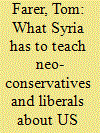

|
|
|
|
|
| Publication |
2013.
|
| Summary/Abstract |
The only means available to the US to assume a responsibility to protect the Syrian people from slaughter was by credibly threatening Bashar al-Assad and the security and military elite surrounding him with a decapitating air strike if they did not immediately cease murdering protestors and begin negotiations with opposition figures to the end of making the regime broadly representative of the Syrian population. Credibility probably demanded an initial decimation, a technically possible move. In part because the US lacks the ideology and institutional structure of a real imperial power, in part because it is post-Bush a careful calculator of national interests, Syria, unlike Libya but much like Sudan and the DRC, was a bridge too far.
|
|
|
|
|
|
|
|
|
|
|
|
|
|
|
|
|
|
|
|
|